Related Research Articles

Human rights are moral principles or norms for certain standards of human behaviour and are regularly protected in municipal and international law. They are commonly understood as inalienable, fundamental rights "to which a person is inherently entitled simply because she or he is a human being" and which are "inherent in all human beings", regardless of their age, ethnic origin, location, language, religion, ethnicity, or any other status. They are applicable everywhere and at every time in the sense of being universal, and they are egalitarian in the sense of being the same for everyone. They are regarded as requiring empathy and the rule of law and imposing an obligation on persons to respect the human rights of others, and it is generally considered that they should not be taken away except as a result of due process based on specific circumstances.

The Universal Declaration of Human Rights (UDHR) is an international document adopted by the United Nations General Assembly that enshrines the rights and freedoms of all human beings. Drafted by a UN committee chaired by Eleanor Roosevelt, it was accepted by the General Assembly as Resolution 217 during its third session on 10 December 1948 at the Palais de Chaillot in Paris, France. Of the 58 members of the United Nations at the time, 48 voted in favour, none against, eight abstained, and two did not vote.
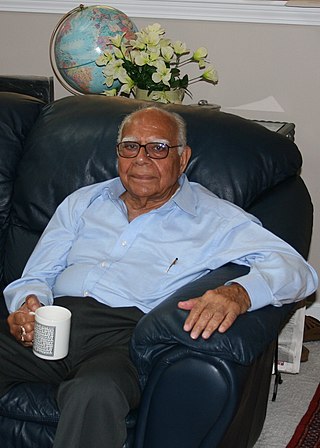
Ram Boolchand Jethmalani was an Indian lawyer and politician. He served as India's Union minister of law and justice, as chairman of the Indian Bar Council, and as the president of the Supreme Court Bar Association.

The Alien Tort Statute, also called the Alien Tort Claims Act (ATCA), is a section in the United States Code that gives federal courts jurisdiction over lawsuits filed by foreign nationals for torts committed in violation of international law. It was first introduced by the Judiciary Act of 1789 and is one of the oldest federal laws still in effect in the U.S.

Irene Zubaida Khan is a Bangladeshi lawyer appointed as of August 2020 to be the United Nations Special Rapporteur for freedom of expression and opinion, the first woman appointed to this mandate. She previously served as the seventh Secretary General of Amnesty International. In 2011, she was elected Director-General of the International Development Law Organization (IDLO) in Rome, an intergovernmental organization that works to promote the rule of law, and sustainable development. She was a consulting editor of The Daily Star in Bangladesh from 2010 to 2011.

Humanists International is an international non-governmental organisation championing secularism and human rights, motivated by secular humanist values. Founded in Amsterdam in 1952, it is an umbrella organisation made up of more than 160 secular humanist, atheist, rationalist, agnostic, skeptic, freethought and Ethical Culture organisations from over 80 countries.
Kamal Hossain is a founding leader, lawyer and politician of Bangladesh. He is known as the "father of the Bangladeshi constitution" and regarded as an icon of secular democracy in the Indian subcontinent. Hossain currently heads his own law firm in Dhaka, serves as president of the Gano Forum political party, and advocates for democratic reform. His autobiography Bangladesh: Quest for Freedom and Justice is an important book on Bangladeshi history, particularly regarding the creation of Bangladesh in 1971.
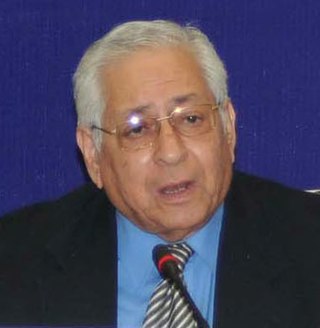
Soli Jehangir Sorabjee, AM was an Indian jurist who served as Attorney-General for India from 1989 to 1990, and again from 1998 to 2004. In 2002, he received the Padma Vibhushan for his defence of the freedom of expression and the protection of human rights.
The Vested Property Act is a controversial law in Bangladesh that allows the government to confiscate property from individuals it deems as an enemy of the state. Before the independence of Bangladesh in 1971, it was known as the Enemy Property Act. It is now called the Vested Property Act – 2013.

Human rights in Bangladesh are enshrined as fundamental rights in Part III of the Constitution of Bangladesh. However, constitutional and legal experts believe many of the country's laws require reform to enforce fundamental rights and reflect democratic values of the 21st century.
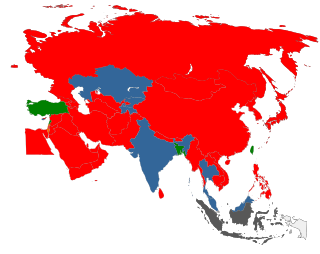
Prostitution is legal and regulated in Bangladesh. Prostitutes must register and state an affidavit stating that they are entering prostitution of their own free choice and that they are unable to find any other work. Bangladeshi prostitutes often suffer poor social conditions and are frequently socially degraded.

The right to housing is the economic, social and cultural rightto adequate housing and shelter. It is recognized in some national constitutions and in the Universal Declaration of Human Rights and International Covenant on Economic, Social and Cultural Rights. The right to housing is regarded as a freestanding right in the International human rights law which was clearly in the 1991 General Comment on Adequate Housing by the UN Committee on Economic, Social and Cultural Rights. The aspect of the right to housing under ICESCR include: availability of services, infrastructure, material and facilities; legal security of tenure; habitability; accessibility; affordability; location and cultural adequacy.
The Lexington Principles on the Rights of Detainees is a body of international due process principles that reflect the prevailing transnational norms in the area of detainee treatment. The Lexington Principles were completed and published on April 1, 2009. The instrument consists of 45 principles and countless annotations prepared by the project's law student editorial board. A primary purpose of the drafters of the Lexington Principles was to assist the jurisprudential evolution of American constitutional due process standards after the U.S. Supreme Court's decision in Boumediene v. Bush. While each Principle is based on international law, all provisions have been drafted to facilitate vertical norm internalization into the domestic legal system of the United States and other common law countries.

The International Crimes Tribunal (Bangladesh) (ICT of Bangladesh) is a domestic war crimes tribunal in Bangladesh set up in 2009 to investigate and prosecute suspects for the genocide committed in 1971 by the Pakistan Army and their local collaborators, Razakars, Al-Badr and Al-Shams during the Bangladesh Liberation War. During the 2008 general election, the Awami League (AL) pledged to try war criminals. The government set up the tribunal after the Awami League won the general election in December 2008 with a more than two-thirds majority in parliament.
Human rights and climate change is a conceptual and legal framework under which international human rights and their relationship to global warming are studied, analyzed, and addressed. The framework has been employed by governments, United Nations organizations, intergovernmental and non-governmental organizations, human rights and environmental advocates, and academics to guide national and international policy on climate change under the United Nations Framework Convention on Climate Change (UNFCCC) and the core international human rights instruments. In 2022 Working Group II of the IPCC suggested that "climate justice comprises justice that links development and human rights to achieve a rights-based approach to addressing climate change".
International legal theory comprises a variety of theoretical and methodological approaches used to explain and analyse the content, formation and effectiveness of public international law and institutions and to suggest improvements. Some approaches center on the question of compliance: why states follow international norms in the absence of a coercive power that ensures compliance. Other approaches focus on the problem of the formation of international rules: why states voluntarily adopt international legal norms, that limit their freedom of action, in the absence of a world legislature. Other perspectives are policy oriented; they elaborate theoretical frameworks and instruments to criticize the existing rules and make suggestions on how to improve them. Some of these approaches are based on domestic legal theory, others are interdisciplinary, while others have been developed expressly to analyse international law.
Capital punishment in Bangladesh is a legal form of punishment for anyone who is over 16, however in practice will not apply to people under 18. Crimes that are currently punishable by death in Bangladesh are set out in the Penal Code 1860. These include waging war against Bangladesh, abetting mutiny, giving false evidence upon which an innocent person suffers death, murder, assisted suicide of a child, attempted murder of a child, and kidnapping. The Code of Criminal Procedure 1898 provides that "he be hanged by the neck until he is dead." For murder cases, the Appellate Division requires trial courts to weigh aggravating and mitigating factors to determine whether the death penalty is warranted.
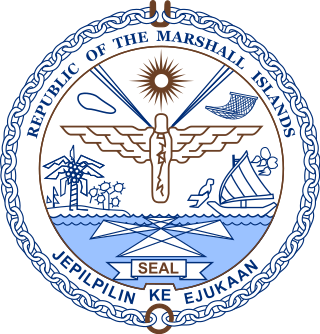
The Marshall Islands is a country in the Pacific spread over 29 coral atolls, with 1,156 islands and islets. It has an estimated population of 68,480 and is one of the sixteen member states of the Pacific Islands Forum. Since 1979, the Marshall Islands has been self-governing.
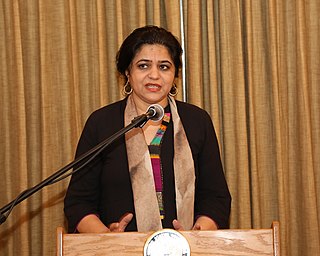
Sara Hossain is a leading Bangladeshi lawyer. She is a barrister in the Supreme Court of Bangladesh. Hossain is the honorary executive director of the Bangladesh Legal Aid and Services Trust (BLAST), a major legal aid provider. Hossain has been at the forefront of advocating for women's rights in Bangladeshi courts and played a key role in drafting legal reforms to protect women. She was the plaintiff's lawyer in the landmark case of Bangladesh National Women Lawyers Association (BNWLW) v. Bangladesh, in which the Supreme Court supported the judicial practice of referring to international human rights law in the absence of domestic legislation. She is known for her role in challenging fatwa violence when a fatwa is issued to mete out punishment to women and girls. Hossain co-edited 'Honour': Crimes, Paradigms and Violence Against Women with Lynn Welchman.
Prabodh Dinkarrao Desai or P. D. Desai was a former Chief Justice of several High Courts of India. He also held the additional charge of the Governor of the Indian state of Himachal Pradesh from 8 March 1986 to 16 April 1986.
References
- 1 2 Roy Chowdhury, Subrata (1989). Rule of law in a state of emergency : the Paris minimum standards of human rights norms in a state of emergency. New York: St. Martin's Press. ISBN 0-312-03195-5. OCLC 19515204.
- 1 2 Roy Chowdhury, Subrata (1972). The genesis of Bangladesh; a study in international legal norms and permissive conscience. Bombay: Asia Pub. House. ISBN 0-210-40504-X. OCLC 415624.
- ↑ Constitutional foundings in South Asia. Kevin Tan, Ridwanul Hoque. Oxford, UK. 2021. ISBN 978-1-5099-3027-2. OCLC 1192304407.
{{cite book}}: CS1 maint: location missing publisher (link) CS1 maint: others (link) - ↑ Hopkins, C. A. (1973). "Review of The Genesis of Bangladesh; The Events in East Pakistan, 1971". The Cambridge Law Journal. 32 (1): 156–158. doi:10.1017/S0008197300090346. ISSN 0008-1973. JSTOR 4505651.
- ↑ Lillich, Richard B. (1985). "The Paris Minimum Standards of Human Rights Norms in a State of Emergency". American Journal of International Law. 79 (4): 1072–1081. doi:10.2307/2201848. ISSN 0002-9300. JSTOR 2201848. S2CID 147494014.